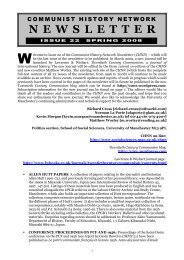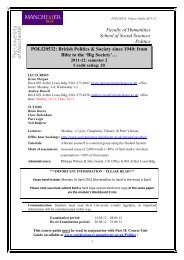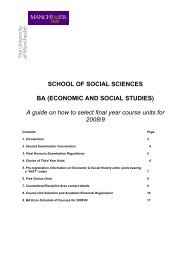second year course outlines 2012-2013 - School of Social Sciences ...
second year course outlines 2012-2013 - School of Social Sciences ...
second year course outlines 2012-2013 - School of Social Sciences ...
Create successful ePaper yourself
Turn your PDF publications into a flip-book with our unique Google optimized e-Paper software.
Communication:<br />
Students must read their University e-mails regularly, as<br />
important information will be communicated in this way.<br />
Examination period: Monday 13 th May <strong>2013</strong> – Friday 7 th June <strong>2013</strong><br />
Re-sit Examination period: Monday 19 th August <strong>2013</strong> – Friday 31 st August <strong>2013</strong><br />
Please read this <strong>course</strong> outline through very carefully as it provides essential information<br />
needed by all students attending this <strong>course</strong><br />
This <strong>course</strong> guide should be read in conjunction with the Philosophy Study Guide.<br />
Copies may be obtained from the Undergraduate Office, G.001 Arthur Lewis Building or from<br />
the SoSS intranet at: http://www.socialsciences.manchester.ac.uk/intranet/ug/handbooks/<br />
2. ABOUT THE COURSE<br />
Summary<br />
This <strong>course</strong> provides a detailed introduction and analysis <strong>of</strong> the central problems and issues<br />
in contemporary philosophy <strong>of</strong> religion.<br />
The questions that we will consider include: Can we prove God’s existence by reason alone?<br />
Is the evidence <strong>of</strong> ‘fine tuning’ conditions in the universe a good reason to believe that God<br />
created it? Is it either consistent or plausible to believe that there is a God given the amount<br />
<strong>of</strong> evil in the world? Can we ever be justified in believing that a miracle has occurred? Is<br />
religious belief rational if there is no evidence in its favour? What is the relationship between<br />
scientific and religious belief?<br />
In the <strong>course</strong> <strong>of</strong> examining these topics we will look at major 20th century and contemporary<br />
writings on religious belief and language, including work by Ludwig Wittgenstein, Alvin<br />
Plantinga and Richard Swinburne.<br />
Aims<br />
- Engagement with some <strong>of</strong> the most central and enduring problems in philosophy <strong>of</strong> religion;<br />
- Enhance your power <strong>of</strong> critical analysis, reasoning and independent thought, and your<br />
ability to bring those powers to bear on important philosophical issues;<br />
- Familiarise you with some <strong>of</strong> the most interesting and provocative texts in contemporary<br />
work on philosophy <strong>of</strong> religion.<br />
Learning Outcomes<br />
79

















